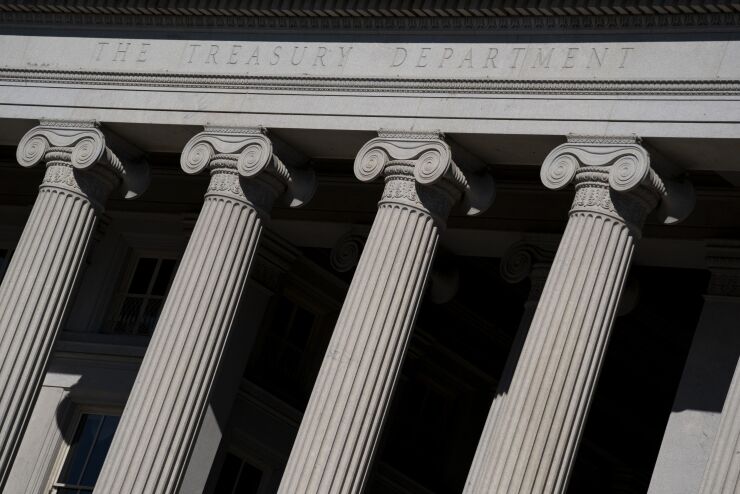
Money talks, and the government listens. Under the
The Bank Secrecy Act authorizes the Treasury Department to require banks and whatever business the government deems a "financial institution" to
But the Bank Secrecy Act is not just a threat to real estate businesses — it's a threat to the privacy of anyone with a bank account or even anyone who engages in virtually any commercial transaction.
The act invites government voyeurism. It gives Treasury the power to force banks or other financial institutions — which can include almost any business — to "report any
There are so many ways to violate federal law that the Treasury could justify just about any search based on any commercial transaction, even a Venmo payment to your gardener. There are well over 300,000 federal regulations with criminal penalties. It is nigh impossible to live past the age of 18 without having committed a federal crime. If you've consulted with a known pirate (crime), teased a nesting bird in a national park (crime) or searched for buried treasure on federal land (crime), then you've become an accidental felon. Given the sheer volume of federal crimes, is there any financial transaction that could not somehow be "relevant to a possible violation of law or regulation?" That Venmo payment to your gardener might show that he hasn't reported all his taxable income.
There is precious little we do that we can keep secret, since most activities these days, criminal or otherwise, involve the swipe of a debit card at some point. Even innocent purchases with no obvious connection to crime — from collecting Pokémon cards to opening a college savings account — could be a means to launder money. The Bank Secrecy Act is more than a crime-fighting tool. It's a window into every wallet in the nation.
And the government is not the sort to politely avert its eyes. With the power granted to it by the Bank Secrecy Act, Treasury has thrown the curtains wide. For some years now, banks have had to snitch on transactions totaling $10,000 in a given day.
The Supreme Court blocked a lower court injunction reinstating two Democrats who had been fired without cause from the National Labor Relations Board and Merit Systems Protection Board, explicitly holding that Federal Reserve Board members would not be affected by the case.
Even attempting to avoid government surveillance under the act can get you in trouble: Those who try to hide their money by, say, engaging in a series of $199 transactions to avoid the threshold may be guilty of a crime called structuring. In other words, it's a crime to try to avoid government snooping. The Biden administration
The Bank Secrecy Act's vast grant of power to pry into Americans' lives has an echo in America's revolutionary history. The British had long abused the colonies with "general writs of assistance," which let customs officials search anyone, anywhere, without suspicion. The framers had these writs fixed in their minds when they penned the Fourth Amendment's protections against unreasonable searches.
A firebrand lawyer named James Otis Jr. took up a case against the general writs of assistance. His courtroom argument in 1761 was, according to John Adams, the match that lit the flame of revolution. Otis argued this boundless authority to search without suspicion let "petty tyrants" abuse citizens at their whim. He asked, "Can a community be safe with an uncontrolled power lodged in the hands of such officers, some of whom have given abundant proof of the danger there is in trusting them with any?" I'd venture to suggest that there are some "petty tyrants" today who "have given abundant proof" that they too cannot be trusted with the power to snoop on Americans.
Thankfully, the Constitution forbids Congress from granting federal agencies boundless power to craft their own surveillance laws. Laws that restrict our freedoms must enjoy the consent of the governed. That means that only our elected representatives have the authority to make law. But Congress often hands off lawmaking power to unelected bureaucrats through open-ended laws.
That's what the Bank Secrecy Act does by authorizing Treasury to require financial institutions "to report any suspicious transaction relevant to a possible violation of law or regulation." This language leaves all the big policy decisions to bureaucrats, placing our rights against unreasonable searches at their disposal.
A healthy skepticism toward government surveillance is an American tradition. East Texas Title and Pacific Legal Foundation's






